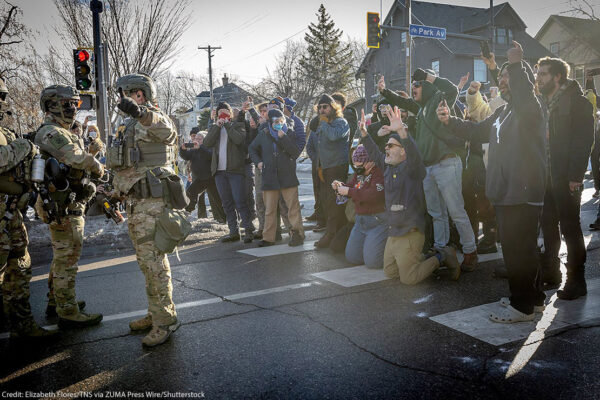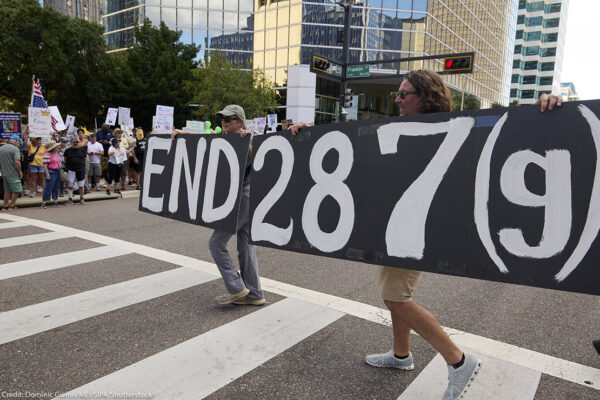NYCLU Urges NYC Council to Oppose Increased Role for City in Detaining, Deporting Immigrants
FOR IMMEDIATE RELEASE
CONTACT: media@aclu.org
NEW YORK - At a joint hearing today of two New York City Council committees, the New York Civil Liberties Union urged council members to oppose the increasing role that city agencies play in facilitating the detention and deportation of immigrants living in New York City.
"New York City has a long history of embracing its immigrant communities and their contributions to the city's diversity, culture, and economic strength," said NYCLU Executive Director Donna Lieberman. "We must say no to programs that threaten core rights and hurt our city's reputation as an international community."
Testifying before the Immigration Committee and the Fire and Criminal Justices Services Committee, NYCLU Advocacy Director Udi Ofer said local immigration enforcement efforts weaken public safety, threaten people's constitutional rights and diminish New York City's reputation as a welcoming place for immigrants.
"Currently in New York City, federal immigration authorities have a permanent presence in our city's jails, and may soon have a direct line to our local police precincts," Ofer said. "As a result, what may have once been a sanctuary city has now become a municipality that facilities the deportation of thousands of its residents every year."
Ofer focused on two federal programs that deputize local law enforcement agencies to enforce federal immigration laws: the Criminal Alien Program, which identifies non-citizens being held in state and local jails with the intent of deporting them upon release; and Secure Communities (S-Comm), which seeks to detain and deport detain and deport immigrants by using fingerprints collected by local police departments.
Between 2004 and 2009, more than 13,000 inmates at Rikers Island were placed into deportation proceedings as a result of the Criminal Alien Program. According to numerous reports, inmates often don't know that they are speaking with federal agents, understand that they could be placed into deportation proceedings as a result of the information they share, or realize that they may refuse to consent to an interview.
Under S-Comm, local law enforcement agencies share the fingerprints of arrestees with Immigration and Customs Enforcement (ICE), which checks the prints against its databases. Initiated in 2007, the program is operating in 467 jurisdictions in 26 states. ICE has stated that it plans to have the program operating in every jurisdiction in the country within three years.
While no municipalities in New York State currently participate in S-Comm, the Bloomberg administration recently stated its intention to do so.
"The City Council should insist that Mayor Bloomberg reject this misguided program," Ofer said. "The program will actually make our neighborhoods less safe by eroding trust between the NYPD and the city's vast immigrant population. It also will increase racial profiling by encouraging police to target anyone who appears foreign."
Ofer recommended that the City Council:
- Insist that Governor Paterson and Governor-elect Cuomo rescind the state's Memorandum of Agreement with the federal government authorizing implementation of Secure Communities in the state. It should publicly announce its opposition to the program, and pass a resolution opposing the city's participation in it.
- Oppose ICE's access to pre-conviction detainees housed at Rikers Island. Moreover, the City Council should oppose the sharing of any information by the Department of Correction about any of its inmates with ICE until and unless a formal written agreement is entered into that sets forth the duties and responsibilities of both ICE and DOC agents in allowing access to inmates by ICE officials, and which protects the rights and confidentiality of inmates.
- Use its oversight authority, and if needed subpoena powers, to aggressively investigate the impact of the increasing collaboration between city agencies and federal immigration authorities.
- Encourage Mayor Bloomberg to revisit Executive Order 41, which is commonly described as establishing a "don't ask, don't tell" mandate on city employees who come in contact with undocumented New Yorkers., and close loopholes that allow collaboration between most local law enforcement and federal immigration authorities.
- Educate federal lawmakers on the impact of federal policies on New York City's immigrant communities and encourage them to end the programs.
To read the NYCLU's full testimony, visit http://www.nyclu.org/files/releases/NYC_Tstmny_%20SComm_11.10.10.pdf.



